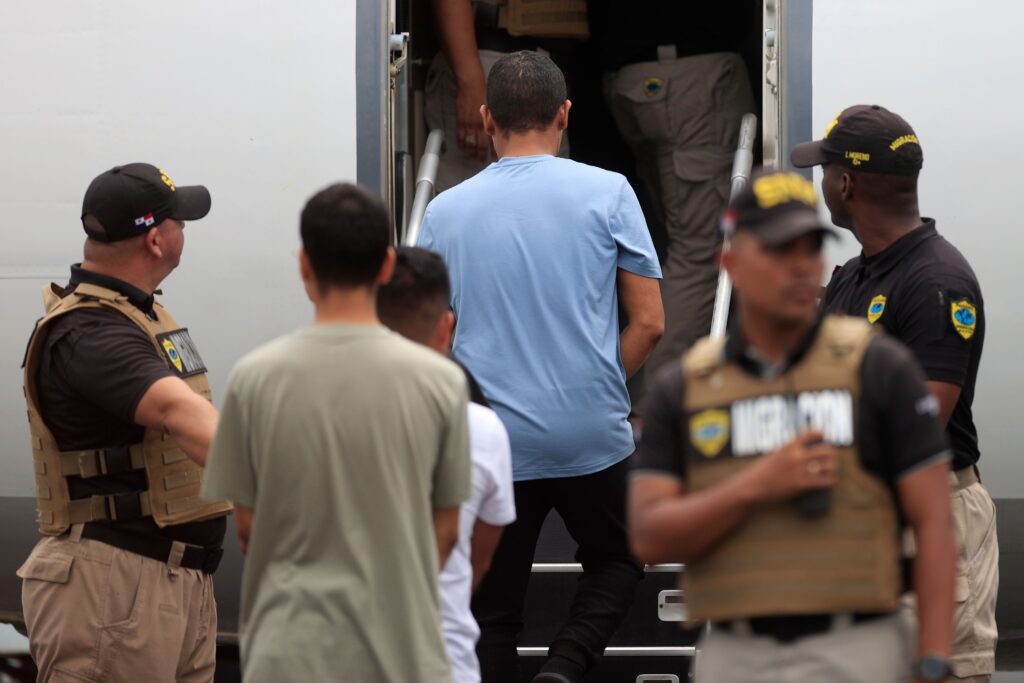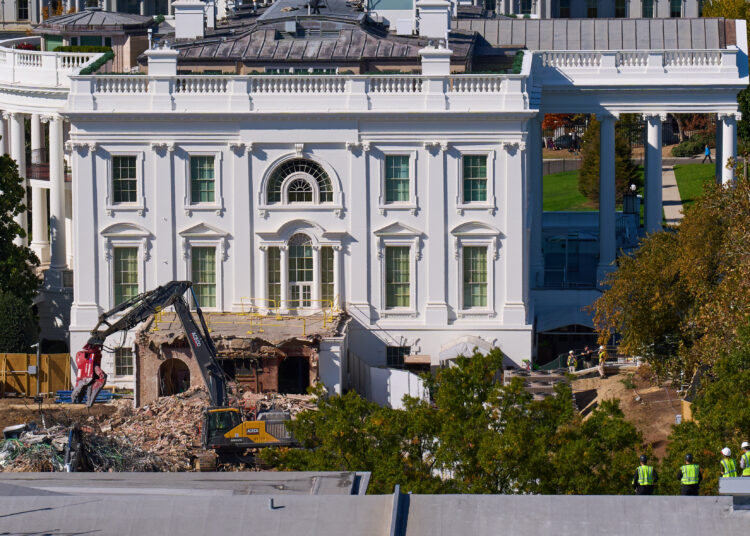President Donald Trump is offering millions of dollars in payments and other incentives to entice countries to accept U.S. deportees with no connection to the places they are being sent. In the process, the United States has made deals with at least one country the State Department has accused of human trafficking and others it has advised U.S. citizens to avoid.
The administration says its is using third-country deportations — the practice of sending people to countries of which they are not citizens — as a method to remove people from the United States in situations where their countries of origin do not want them.
Attorneys representing some of these deportees have disputed the Trump administration’s reasoning, and their countries of origin have in some cases said they would in fact take U.S. deportees.
The Washington Post reviewed copies of the deportation agreements between the Trump administration and some of the third countries in question, as well as related court documents and public records. The deals, brokered during Trump’s second term, outline the procedure for transferring a noncitizen from the United States to a third country — and what each country stands to gain.
Human rights advocates have raised concerns about the contours of the deals, including whether Washington will be able to conduct proper oversight of the funds. “We have no idea what the money can be used for. It seems like the U.S. is not putting any direction or restrictions,” said Nicole Widdersheim, deputy Washington director at Human Rights Watch. “And even if they did, they couldn’t track it like, say, arms sales. It’s a cash transfer.”
The countries don’t have to report to the U.S. government, Widdersheim added.
“Implementing the Trump Administration’s immigration policies is a top priority for the Department of State,” the Sate Department said in a statement, in response to queries about the deals.
Here are some of the countries taking money from the Trump administration to accept deportees and what they are getting in return.
Equatorial Guinea
The United States has paid Equatorial Guinea, a small country on the western coast of Africa, $7.5 million in exchange for agreeing to accept third-country deportees, according to Sen. Jeanne Shaheen (New Hampshire), the top Democrat on the Senate Foreign Relations Committee.
In a Nov. 10 letter addressed to Secretary of State Marco Rubio, Shaheen raised worries about the removal of migrants to a country ranked 173rd out of 180 on corruption on Transparency International’s Corruption Perceptions Index, where senior governmental officials have been accused of engaging in human trafficking and other rights abuses. Its president, Teodoro Obiang Nguema, who has ruled since 1979, has been accused of corruption and misappropriation of public funds. So, too, has his son, who serves as vice president.
“I have serious concerns over whether, without appropriate oversight mechanisms and guardrails, a direct payment to Equatorial Guinea’s government could be used to facilitate human trafficking,” Shaheen wrote, citing a 2025 State Department report that highlighted senior officials’ “complicity” in human trafficking crimes in the country.
The payment is the largest of its kind made to Equatorial Guinea, exceeding the amount of U.S. foreign assistance provided to the country over the last eight years combined, Shaheen wrote.
The Trump administration paid Obiang’s government directly using funds from the State Department’s Migration and Refugee Assistance account, which funds organizations that assist refugees, Shaheen wrote.
It’s unclear how many deportees the Central African nation agreed to accept. The country’s embassy in Washington did not respond immediately to a request for comment.
Eswatini
In May, the United States signed a deportation deal with Eswatini, a small, landlocked country in southern Africa, which agreed to accept up to 160 deportees in exchange for $5.1 million from the United States — allocated toward building “border and migration management capacity,” according to a copy of the deal dated May 14.
According to the document, the money can be used to relocate deportees and stand up infrastructure to move them.
Under the deal, the United States is to cooperate with Eswatini on an “ongoing basis” to identify third-country nationals for removal to the African country, including those “with criminal backgrounds and/or who are designated suspected terrorists,” the agreement reads.
Eswatini’s acting government spokesperson Thabile Mdluli acknowledged the agreement in July, writing in a statement that the deportees will eventually be moved back to their countries of origin.
So far, just one deportee has been returned to his country of birth, according to interviews with attorneys based in the United States and Eswatini. Orville Etoria, 62, who had lived in New York for nearly half a century, was a part of the first group of men deported to the country, in July. He was held at the Matsapha Correctional Center, the country’s main maximum-security prison, for more than two months before the International Organization for Migration facilitated his return to Jamaica, said Orville’s attorney, Mia Unger.
The Trump administration has separately raised alarm over Eswatini’s eroding human rights situation, noting arbitrary or unlawful killings; torture and cruel, inhuman, or degrading treatment or punishment; and restrictions on freedom of expression, among other issues.
At least 14 deportees remain imprisoned in Eswatini without charge or access to legal counsel, attorneys say. One of them, Roberto Mosquera del Peral, went on a month-long hunger strike to protest his detention. The 58-year old Cuban national was brought to a local hospital on Nov. 10 for abdominal pain, according to his attorney Alma David. Although he has since been discharged, David said she is “extremely concerned” about his safety because authorities in Eswatini maintain that Mosquera is fasting for religious reasons and would not intervene.
Why is he “being kept in an African prison where he’s never committed a crime?” asked Ada, a childhood friend of Mosquera who spoke on the condition of being identified by only her first name for fear of relation against family members facing U.S. deportation.
The Trump administration has washed its hands of all responsibility, David said, adding that Mosquera feared returning to Cuba: His mother was politically persecuted there, David said, and Mosquera was concerned he would face the same fate.
El Salvador
The United States in March sent more than 250 Venezuelan migrants to a high-security prison in El Salvador.
That month, White House press secretary Karoline Leavitt said that the U.S. paid “approximately $6 million” to El Salvador to detain the migrants. Most of the migrants were deported under the wartime Alien Enemies Act; about 100 others were removed through regular immigration proceedings, Leavitt said. She alleged that 23 of them were MS-13 Salvadoran gang members.
“That is pennies on the dollar in comparison to the cost of life and the cost it would impose on the American taxpayer to house these terrorists in maximum-security prisons here in the United States of America,” Leavitt said.
All the detainees were sent back home from El Salvador to Venezuela in July in a deal negotiated by Washington, Caracas and San Salvador. In exchange, 10 American citizens and permanent U.S. residents imprisoned in Venezuela were released.
Rwanda
Rwanda agreed to accept up to 250 deportees in exchange for “an upfront disbursement” of $7.5 million from the U.S. government, according to a copy of the deal signed June 3.
The Rwanda agreement is similar to the deal the Trump administration signed with Eswatini in May, saying the money can be used to “strengthen Rwanda’s border and migration management capacity, including relocation assistance and associated infrastructure necessary to administer such assistance.”
In the text of the deal, the Trump administration noted the country’s “established expertise in managing complex return and integration and reintegration processes, including the reintegration of individuals requiring structured support.”
The Rwandan Embassy in Washington did not respond immediately to a request for comment on the deal.
This is not the first time the Trump administration has paid Rwanda to accept deportees. In April, the United States made a one-time payment of $100,000 to the Rwandan government to take in an Iraqi deportee. Rwanda also agreed to take in an additional 10 deportees of various nationalities as part of a “durable program” for accepting other removals.
The Trump administration signed its latest deportation deal with Rwanda while brokering a separate peace agreement between the East African country and the Democratic Republic of Congo, meant to end their long-running conflict.
Widdersheim, of Human Rights Watch, called the $7.5 million deal alarming, pointing to previous U.S. government restrictions on assistance to Rwanda. Congo has accused Rwanda of using the M23 paramilitary to terrorize Hutu communities and loot the country’s vast mineral reserves.
Rwanda “is still backing M23 in eastern DRC,” Widdersheim said.
Ghana
Ghana agreed to accept, detain and deport at least 40 West African migrants sent by the United States, in exchange for relaxed sanctions, tariffs and immigration restrictions, according to a lawsuit filed in October by rights group Democracy Hub, which has been working with deportees sent there.
Ghanaian officials have cast the agreement as an act of pan-African empathy, noting that citizens of other West African nations are able to enter and stay in the country for 90 days without a visa.
“We were approached by the U.S. to accept third-party nationals who were being removed from the U.S., and we agreed with them that West African nationals were acceptable,” Ghanaian President John Mahama said in September. “West Africa has a protocol of free movement. Any West African is welcome in Ghana.”
At least 42 West Africans have been deported to Ghana since September, according to the lawsuit. More have been sent since the lawsuit was filed, said Meredyth Yoon, a lawyer for some of the deportees. Some have been repatriated to their countries of birth, while others were sent to a military camp located on the outskirts of the capital city of Accra.
The post These countries are taking millions from Trump to accept U.S. deportees appeared first on Washington Post.




